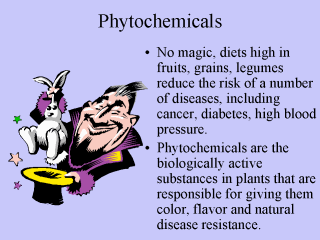 |
Diets high in
fruits, vegetables, grains, and legumes appear to reduce the risk of number of diseases,
including cancer, heart diseases, diabetes and high blood pressure. The disease preventing
effects of these foods are partly due to antioxidants-specific vitamins, minerals and
enzymes that help prevent cancer and other disorders by protecting cells against damage
from oxidation. Phytochemicals are the biologically active substances in plants that are
responsible for giving them color, flavor and natural disease resistance. To understand
how Phytochemicals protect the body against cancer, it is necessary to know that cancer
formation is a multiple process. Phytochemicals seem to fight cancer by blocking one or
more of the steps that lead to cancer. For instance, cancer can begin when a carcinogenic
molecule – from the food you eat or the air you breathe invades a cell. But if
sulforaphane, a physiochemical found in broccoli, also reaches the cell, it activates a
group of enzymes that whisk the carcinogen out of the cell before it can cause any harm.
Although no long-term human studies have shown that specific Phytochemicals stop cancer,
research on Phytochemicals supports the more than 200 studies that link lowered cancer
risk with a diet rich in grains, legumes, fruits and vegetables. Moreover , animal and in
vitro studies have demonstrated how some Phytochemicals prevent carcinogens from promoting
the growth of specific cancers. For instance, the photochemical phenethyl isothiocyanate
(PETTIC), found in cabbage and turnips has been known to inhibit the growth of lung cancer
in rats and mice. Among other things, PEITC protects the cells DNA from a potent
carcinogen found in tobacco smoke. |
